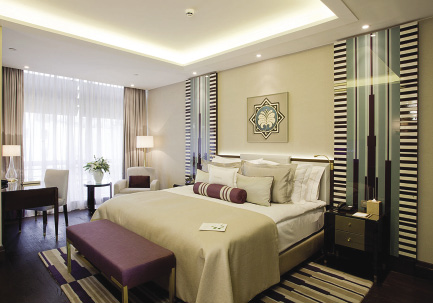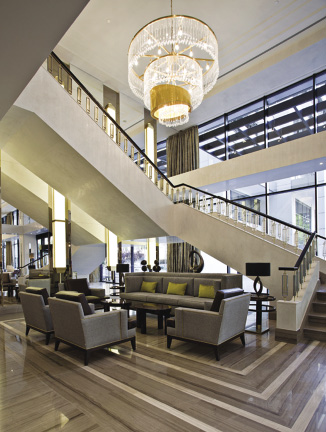- Home
- Media Kit
- Current Issue
- Past Issues
- Ad Specs-Submission
- Ad Print Settings
- Reprints (PDF)
- Photo Specifications (PDF)
- Contact Us

![]()
ONLINE

Part of the Local Fabric
Editors’ Note
In May 2012, Sedat Nemli was appointed by the Turkish Marti Group to lead the opening of the five-star, 270-room address in the commercial and cultural heart of Istanbul. Nemli joined Marti Istanbul Hotel from The Istanbul EDITION, an Ian Schrager and Marriott International venture in the city’s financial district, where he was General Manager beginning in May 2010. He held the same title for three years at Kempinski Hybernská Prague in the city’s historic center and for nearly a year at the beachfront Kempinski Hotel The Dome in Belek, Antalya, Turkey. Previously, Nemli was on the sales side, with seven years’ experience as Regional VP Sales & Marketing, Americas at the New York International Sales Office of Kempinski Hotels and three years as Director of Sales & Marketing for Ciragan Palace Kempinski Istanbul. He was also a Vice President overseeing operations of Megatrails, Inc., a New York-based tour operator. He began his career in the hotel industry as Sales Manager for the Middle East, North Africa, and Turkey for Mövenpick Hotels & Resorts in 1986. Nemli earned an undergraduate degree from the University of Sussex in Brighton, England and an M.B.A. from Reims Management School in Reims, France.
Property Brief
Marti Istanbul (martiistanbulhotel.com) is an elegant new five-star hotel located in Taksim, the shopping, cultural, and commercial heart of the city, and also home to the foremost entertainment venues and a bustling nightlife. This glamorous property is within easy reach of all major historic sites and ancient bazaars, as well as a short ride to the famed Bosphorus shores. Designed by internationally acclaimed interior designer Zeynep Fadillioglu, Marti Istanbul Hotel comprises 270 luxurious guest rooms and suites spread over 11 floors. The hotel offers a full range of luxury services and amenities, from tastefully appointed restaurants and generous meeting facilities to an exceptional, top-floor spa.
What makes the Marti Istanbul Hotel unique in its space?
Istanbul has become an increasingly attractive destination in recent years for both local and international hotel brands to want to have a home. Our company is a home-grown brand – it has been around for almost 50 years but its specialty was in resort operations in Southern Turkey. This is their first venture into an urban operation.
Being part of the local fabric, Istanbul was the obvious choice, and the company identified a strong location in the city center, a part of the city that is attractive in terms of access and getting to the historic and contemporary parts of town.
The property was a recently built structure that had been intentionally left empty with the aim of it being converted into a hotel or an office, but we took occupancy and converted an interior in nine months with the goal to have a flagship for the organization and make our mark in Istanbul, which is an increasingly busy market but one that allows for more players.

Marti Istanbul Hotel guest room
We’re surrounded in this area by many international and successful brands coupled with several other Turkish five-star and other hotels.
We hired a top-notch designer and invested substantially into this conversion process to come up with a 270-key property with spacious guest rooms and suites, and public areas – restaurants, meeting facilities, and a substantial spa – to offer the full five-star experience with a strong emphasis on Turkish hospitality in a city that is attracting a number of corporate and year-round leisure travelers.
We officially opened in September 2012 and the full operational structure came together by the end of the year. So we’re still new, yet we have started growing in stature and have garnered international recognition.
How does your food and beverage concept play within the community, which offers a number of fine stand-alone restaurants?
It’s challenging, so there is a growing tendency to outsource food and beverage operations to a third party. As a first-time brand in Istanbul, we wanted to offer an all-around experience, so we decided to build food and beverage on two levels: we offer one restaurant with a distinctly Turkish accent, so for those guests who wish to stay in the hotel for one or two meals, they find something which is very well done and very Turkish at Quad Restaurant & Bar on the mezzanine level.
Brass is our restaurant on the street level with an entrance from the courtyard for more stand-alone appeal. We opted to make that restaurant more casual and brasserie-style with primarily international seasonal items.

Marti Istanbul Hotel lobby
How important is the emphasis on the spa? Are you managing it yourselves?
We have a partnership with a local operator called Spa Soul that has experience running spaces in five-star hotels. We have created a substantial spa – we wanted to emphasize our Turkish culture, so we have large hammams, which are getting a lot of recognition worldwide. We also built a Roman bath within the structure.
Guests who come to our hotel are of a different complexion. They might come at first for a business trip, but we have already started to receive repeat guests for leisure purposes. As a result, the hotel facilities like the spa become important.
On the other hand, we can promote this important space in the hotel to the local city dwellers. We have started to promote memberships to the fitness area and we have a lot of walk-in business from our neighborhood and other hotels.
Is the ballroom space more focused for high-level intimate events?
We have one ballroom, which is 3,600 square feet, and we have six other rooms that offer independent or breakout facilities. All of these rooms offer natural daylight and there is hardly any interruption to the room itself.
We have had a couple of weddings, but often have corporate presentations, meetings, seminars and concerts in particular, because our hotel sponsors a monthly classical concert event. The breakout rooms have been multi-purpose where they have served as smaller meeting spaces or private dining rooms.
What kind of investment have you made on the technology side? With all of the advances in that regard, how do you avoid losing the personal interaction with the guest?
We offer substantial technology within the building itself that people have come to expect from any hotel.
We have invested in on-premise efficient technology like Wi-Fi and other requirements.
On the other hand, luxury operations require the personal touch and therefore, we don’t want to alienate the guests from that experience. Hospitality has to involve face-to-face interaction.
So we want to keep all those traditions and have technology be a means to an end in fulfilling the needs of our guests.•